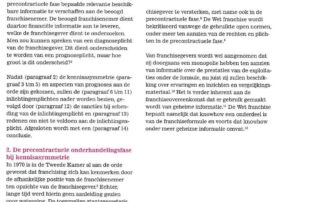Prohibited market/area division in franchise agreements
Franchisees sometimes have more opportunities to break through market/area divisions than they think. This will create more problems for franchisors.
Many franchise agreements include a market division in the sense that each franchisee has been allocated an exclusive territory. Franchisees may then, for example, not make acquisitions in the territories of other franchisees. Such agreements aimed at sharing markets have an anti-competitive object and are, in principle, prohibited.
An exception to the prohibition may apply to franchise agreements, among other things. After all, franchise agreements can usually be seen as a “vertical” relationship in the relevant distribution chain. The franchisor is then the supplier and the franchisee the customer. In such a “vertical” relationship, a market division can also very well promote competition.
The fact that franchising does not always have to involve such a “vertical” relationship is apparent from the judgment of the Rotterdam District Court of 12 May 2016, ECLI:NL:RBROT:2016:3477, in which it was ruled that agreements on exclusive market areas (area distribution ) being forbidden. It follows from this ruling, in simplified form, that despite the fact that the parties refer to their cooperation as a “franchise agreement”, there need not be an exemption from the prohibition on market/area division. This applies if the cooperation under a franchise agreement can actually be qualified as a cooperation between the franchisees themselves.
The foregoing also raises the question of how franchise agreements should be assessed in which the franchisees are members of the same cooperative. In a cooperative, in particular, the franchisees work together and there is no vertical relationship. In that case, market sharing agreements would therefore be prohibited. Examples of such cooperative organizations are Primera, PLUS supermarkets and Coop supermarkets.
The danger is that franchisees can also be fined here by the AFM, which supervises competition law practices. Could this herald the end of the franchise organizations that aim to work together on a collective level? In any case, it seems that market sharing agreements in those situations are not without risk for the franchisee and for the franchisor.
mr. AW Dolphijn – Franchise lawyer
Ludwig & Van Dam Franchise attorneys, franchise legal advice.
Do you want to respond? Go to dolphijn@ludwigvandam.nl

Other messages
Litigation as a franchisees association.
The Eye Wish Opticiens franchisees have recently filed opposition to ...
Between the franchisor’s diagnosis and forecasting duty
In the leading legal scientific journal WPNR, Mr. Dolphijn a ...
Franchise+ article: “Violation of a non-compete clause will cost the franchisee dearly.” – mr. C. Damen – September 23, 2021
The fact that the violation of a non-compete clause included ...
Article De Nationale Franchise Gids: “Unjustified cancellation by the franchisor: settle the bill.” – mr. C. Damen – dated September 20, 2021
The preliminary relief judge in Rotterdam recently ruled that the ...
Interview Mr. AW Doplphijn in Distrifood: “Legal consequences of merger Plus-Coop for entrepreneurs.” – dated September 12, 2021
"Dolphin hereby cites a theory that is also alive among ...
Supermarket Newsletter – No. 32 –
Supermarkets COOP and PLUS merge The intended merger will mean ...




